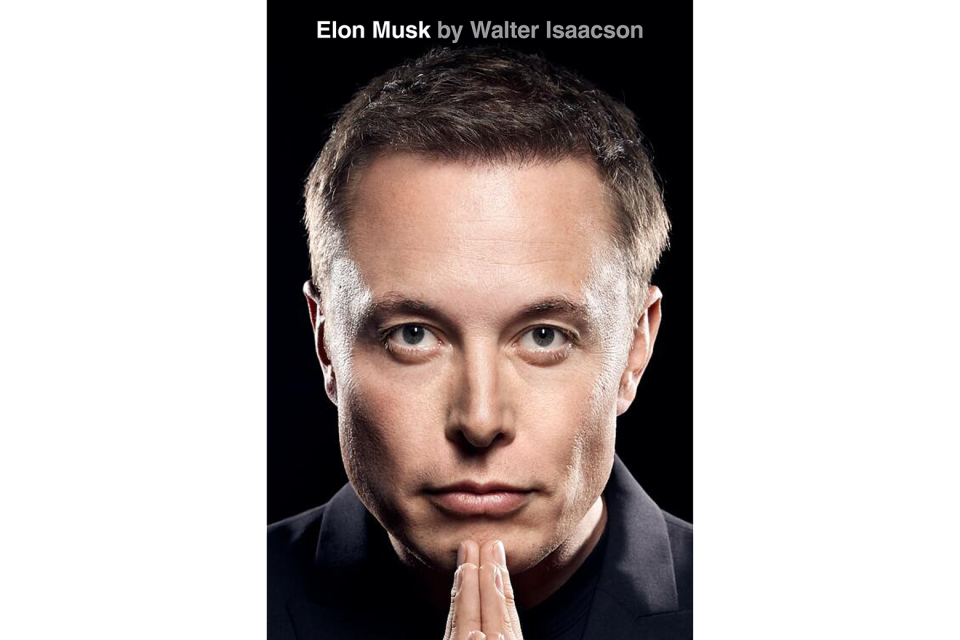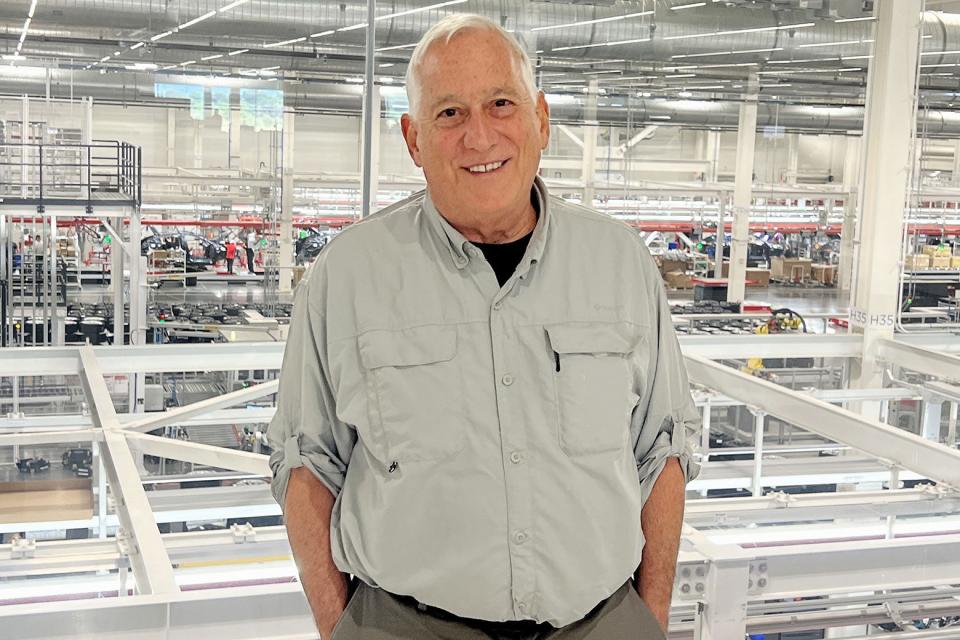The New Elon Musk Biography Doesn’t Tell Us Much About Him. But It Does Tell Us All About Someone Even Worse.

- Oops!Something went wrong.Please try again later.
Who, exactly, is going to read a 600-page book about Elon Musk? That’s the real question raised by the publication of Walter Isaacson’s doorstop biography on Tuesday, and it’s not merely rhetorical. The book’s release may have provided critics and observers with the opportunity to muse on Musk’s character, to comb Isaacson’s reporting for sensational (and in one instance, incorrect) scoops, and to unload a bunch of zingers at the expense of both the billionaire and his Boswell. But Elon Musk doesn’t contain much in the way of genuine revelation, because Musk himself, while volatile, isn’t especially deep or complicated. In place of self-reflection, he offers up armchair diagnoses to explain his own personality—Asperger’s syndrome, bipolar disorder, ADHD—but it’s not as if he’s prepared to do anything about that, and the Musk that Isaacson introduces in the first few chapters of the book is virtually the same man by the end.
Just as Musk idolators refuse to believe that he sometimes doesn’t know what he’s doing, people repelled by Musk’s politics and boorish behavior like to insist that he’s little more than a huckster who hijacks other people’s innovations and then markets himself as a genius. Perhaps the exhaustive accounts Isaacson offers of SpaceX launches and Tesla product development processes are meant to dispel this notion. He certainly substantiates the picture of Musk as brilliant and talented, albeit across a somewhat narrow spectrum. Isaacson’s Musk is less an inventor than a perfecter, a specialist in what Musk calls “building the machine that makes the machine,” honing rockets and cars down to their essentials and designing factories that can produce them quickly at drastically reduced cost. At the same time, Musk’s jejune notion of “coolness,” derived from science-fiction novels and video games, attunes him to the 12-year-old boy inside every man who can’t bring himself to buy an electric vehicle unless it looks like a sleek spaceship rather than a golf cart.
There’s more of this procedural material in Elon Musk than there is dish about its subject’s florid personal life—the abusive father, the celebrity pals and girlfriends, the rivalry with Jeff Bezos, the ranting about “the woke mind virus,” etc. This might seem a misplaced emphasis to those who view Musk primarily as a player in the culture wars. But people like that are not the people who will buy Isaacson’s book, which will surely chart on the bestseller lists released next week. Isaacson isn’t writing for other journalists or critics. Far more interesting than the portrait Elon Musk offers of its subject is the detectable outline of its intended reader. That shadowy figure may be even more disturbing than Musk at his worst.

The former editor in chief of Time, with its coveted Person-of-the-Year issue, and the former president of the Aspen Institute, with its TED-like annual Ideas Festival, Isaacson has long drawn from the lucrative wells of the great man theory—the belief that history is shaped by extraordinary individuals rather than larger structural or economic forces. You can buy his bestselling 2011 biography of Steve Jobs in a box set with Isaacson’s biographies of Albert Einstein, Benjamin Franklin, and Leonardo da Vinci, marketed as “The Genius Biographies.” They resemble traditional biographies superficially, but are clearly meant to be read with a more utilitarian purpose. An Amazon reviewer who praises the books for presenting “a wealth of knowledge I’m already implementing to enrich my life” puts it well. These books are less biography as literature than biography as self-help. They’re aimed at a readership of strivers whose gender makeup can be inferred by the fact that Isaacson’s 2021 biography of the Nobel Prize–winning biochemist Jennifer Doudna—a work that admirably aims to counter the great man theory—isn’t included in the pack.
Elon Musk is Isaacson’s return to the more popular vein of Steve Jobs. Even the biography’s cover emphasizes the parallel (and probably delights Musk). Isaacson repeatedly compares Musk with Jobs: in his meticulous attention to detail, in his emphasis on elegant design as an indispensable element of a product’s success, in the seeming impossible deadlines he imposed on his staff. Both men engaged in behavior that epitomizes a set of entrepreneurial and Silicon Valley beliefs, even if Musk wasn’t really in the tech industry during the 22-year period after he got pushed out of PayPal and before he bought Twitter. Isaacson uses buzz phrases like “move fast and break things” and lauds Musk’s hunger for risk as the font of his ability to “innovate.” (An odd thing about the way business gurus go on and on about innovation is that they can’t seem to describe it without using the most tired, chewed-up clichés.)
As he did with Steve Jobs, Isaacson organizes his Musk biography around the central question of whether his subject could have been such a genius if he weren’t also such an asshole. “Could you get the rockets to orbit or the transition to electric vehicles without accepting all aspects of him, hinged and unhinged?” he writes. Don’t you have to be kind of crazy not just to believe you can “change the world”—the ultimate Silicon Valley cliché—but to actually change it? Maybe the only way to obtain “excellence” from one’s workers is to berate and intimidate them, to demand that they work 14-hour days and ditch birthday parties and family holidays the minute the boss crooks his finger. In Musk’s case, Isaacson speculates, “one can admire a person’s good traits and decry the bad ones. But it’s also important to understand how the strands are woven together, sometimes tightly.” Isaacson claims that Musk’s “epic feats” don’t excuse his worst behavior, but really, that’s what Elon Musk is: a 600-page excuse.

Is it true that the space-travel industry had become so sleepy and “sclerotic” that it needed a renegade like Musk to jar it awake? Very likely. Did Musk’s Tesla give the electric car market—and with it progress toward a sustainable-energy economy—a tremendous boost forward? Yes. But these genuine successes are partly the result of peculiarities in Musk’s character, such as his comprehensive grasp of materials science (a subject he considered going to graduate school to study), his ability to remember almost everything he reads, his obsessive immersion in the task at hand, and his persistence, which borders on the superhuman. His bad treatment of those around him is often a byproduct of these traits, but whether it’s a necessary byproduct is open to question—a question Isaacson never really gets around to asking. Somehow, the fetishizing of change and innovation always stops short of a revolution in interpersonal relations.
The danger with books like Steve Jobs and Elon Musk is that they encourage the lazy reversal of Isaacson’s formula: If a boss abuses and exploits his staff and family, then he must be a genius transforming the world! As Slate’s Nitish Pahwa recently pointed out, every CEO talks like Elon Musk now—firing employees on a whim, piling impossible workloads on those who remain, and demanding a degree of commitment and loyalty that they have no intention of reciprocating. No doubt they feel validated in this by an example like Musk. But such CEOs forget that Musk is an engineer at heart, overseeing a workforce of fellow engineers and above all giving them a chance to work on the kinds of projects that they dreamed about being a part of as kids. It’s one thing to ask someone to give 400 percent when the goal is to fire a rocket into outer space and colonize Mars. It’s another kettle of fish if you’re complaining about workers’ lack of wholehearted commitment to your luxury real estate firm. Isaacson interviewed several SpaceX and Tesla employees who said they tolerated Musk’s erratic and sometimes brutal management style only because the projects themselves were so thrilling. Even so, some of them still quit after a year or two of turmoil.
Furthermore, like many engineers—who tend to see themselves as the only truly practical and effective people in their workplaces—Musk overestimates how many of life’s problems can be solved by engineers. At Twitter, he has made a string of mistakes and miscalculations as a result of this blind spot, from launching Twitter Blue without sufficient safeguards to prevent impersonators, to failing to anticipate that advertisers don’t want to be associated with the sort of toxic content that flooded the site after he rolled back much of the moderation. Addicted to Twitter himself—Elon Musk features more than one scene in which Musk checks out of an intimate family moment to tweet—Musk can’t seem to see how his self-professed inability to “read social cues” or consider other people’s feelings might be a bit of an liability in trying to run a social network.
Isaacson acknowledges all these shortcomings. But compared to the pages and pages of admiring descriptions of SpaceX launches—the glamor of space travel can dazzle writers as well as engineers—this amounts to a tiny caveat. What goes unstated in Elon Musk is that luck, timing, and (before Twitter) a focus on enterprises to which his freakish talents are uniquely suited also explain much of Musk’s success. How could he serve as a role model for anyone but Elon Musk? The readers—and there will be many of them—who come away from Isaacson’s biography thinking they’ve gleaned such valuable managerial principles as “empathy is not an asset” may, indeed, end up changing the world. But they won’t be changing it for the better.

